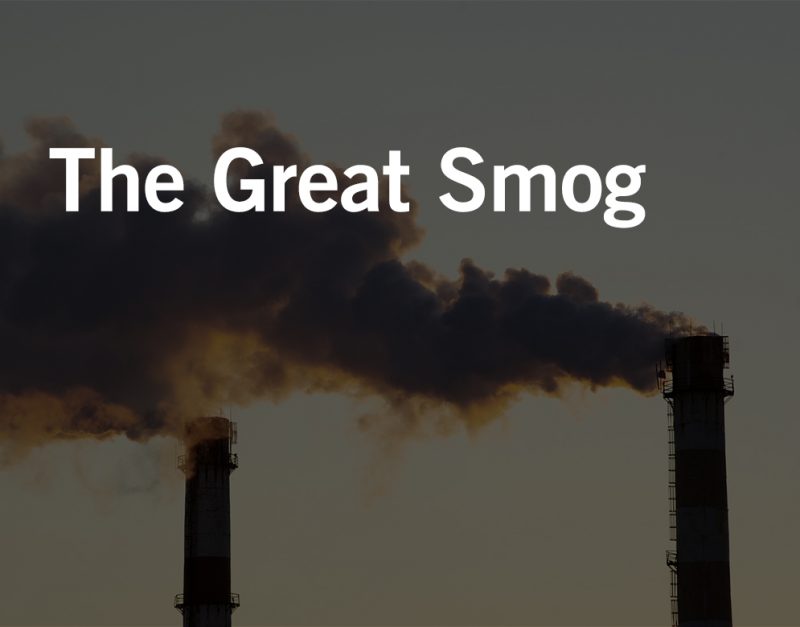 October 27, 2017
October 27, 2017 The 20 Dead and Thousands Left Sick by the 1948 Great Smog of Donora were the Spark to Ignite the Clean Air Movement and Corporate Responsibility
In 1948, in the small town of Donora, Pennsylvania, the last week of October could have been the scene of a horror movie. A dark, thick fog descended on the city and remained there for five days. By the time it finally vanished, 20 people were left dead and nearly half of the 14,000 residents were sick. But what caused this tragedy?
The Cause of the Great Smog of Donora
The town of Donora was home to two large mills – the American Steel & Wire Co. and Donora Zinc Works. These mills, while providing a job for nearly half of the town’s residents, were also the source of a large amount of pollutants released into the air. During the last week of October in 1948 these pollutants became trapped near the ground by a weather pattern called a temperature inversion. A temperature inversion occurs when warm air rises above cold air and traps the cold air near the surface. The temperature inversion didn’t only trap cold air – it also trapped the toxic emissions from the mills, endangering the employees and other townspeople.
As the smog thickened and swallowed up the city, residents began experiencing breathing difficulties from inhaling the deadly smog. After five days, the smog finally ended when a rainstorm broke up the temperature inversion and the pollutants were released into the atmosphere. Twenty elderly people died from breathing problems caused by the poisonous industrial smog, and around 6,000 residents suffered from symptoms such as vomiting, stomach pains, and headaches.
While the mills pointed their finger at the temperature inversion, blaming it as the cause of the smog, the pollutants from the factories most surely played a substantial role as well. While the smog left many dead and sick, it served as a wakeup call to factory owners and the entire nation.
The Beginning of Clean Air
The Great Smog of Donora was a tragedy, but out of the smog rose a newly found national passion for cleaning the air. In 1955, just a few years after the incident, Congress passed the Air Pollution Control Act. This was the first piece of legislation passed that recognized the serious problem of air pollution. In 1970, a revamped Clean Air Act was passed, which set strict standards on air quality that mills and factories had to adhere to. Because of the regulations that arose as a response to the Great Smog of 1948, working conditions were improved, and emissions of dangerous pollutants such as sulfur dioxide, lead, and carbon monoxide have dramatically decreased.
The Example Set by the Great Smog of Donora
The Great Smog of Donora serves as a prime example of the need to have checks on corporations and industries. While pollution emissions are now heavily regulated, many corporations and industries are still lacking the sort of controls that are needed to keep people safe and healthy.
Further areas that need enhanced controls are:
- Asbestos – this lethal mineral, the sole known cause of the deadly disease mesothelioma, has yet to be banned in the U.S. even though it causes over 2,000 deaths annually.
- Benzene – this highly toxic chemical is used for dozens of industrial purposes, even though there has been a publicized relationship between benzene and leukemia, as well as other blood diseases, since the 1920s.
- Pesticides used in commercial farming – pesticide exposure during pregnancy has been strongly linked to severe facial birth defects, functional birth defects, and even having a baby born with missing limbs.
How Can Waters Kraus Paul & Siegel Help?
The mid-sized plaintiffs’ firm of Waters Kraus Paul & Siegel represents many people who have been injured by exposure to toxic substances while on the job. We are dedicated to fighting for stronger controls on corporations that utilize dangerous minerals and chemicals such as asbestos, pesticides, and benzene to stop them from endangering workers and the public. The experienced attorneys at Waters Kraus Paul & Siegel are tirelessly standing up to corporations that put profits ahead of the safety of our clients. Email us or call 800.226.9880 to find out how the attorneys of Waters Kraus Paul & Siegel can help you hold negligent corporations responsible for the injuries they have caused you.


